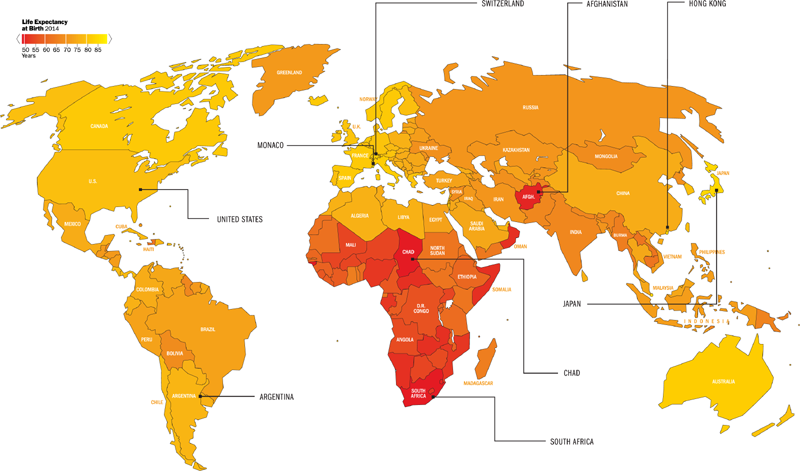
GLOBAL EDGE
THE LIFE EXPECTANCY OF a population can reveal more than just who’s genetically blessed, who eats the best and who’s got access to the best doctors. Average life spans can also shed light on the devastating realities of war and epidemic—things that take people before their time. Here’s a glimpse, according to the CIA World Factbook, of how different countries stack up.

MONACO
89.6 years
This tiny principality has the longest life expectancy on the planet, thanks in part to diet, lifestyle, wealth and abundant health care.
UNITED STATES
79.6 YEARS
Living to nearly 80 may seem like a long time, but compared with other countries, the U.S. ranks 42nd in terms of longevity.
ARGENTINA
77.5 YEARS
There is a more-than-six-year gap between life expectancy for men and women. Here, the ladies live longer.
SWITZERLAND
82.4 YEARS
A good economy, low obesity rates and excellent health care contribute to this being the oldest-living European country.
JAPAN
84.5 YEARS
The Japanese work longer, live longer and eat more vegetables than almost any other people in the world. A robust health system helps too.
CHAD
49.4 YEARS
Chad has the lowest life expectancy in the world. High maternal and infant mortality, poor sanitation and limited health care are factors.
SOUTH AFRICA
49.6 YEARS
South Africa’s HIV/AIDS epidemic in part accounts for its very short life expectancy.
AFGHANISTAN
50.5 YEARS
Ongoing war and instability in the region keep the average life expectancy low.
HONG KONG
82.8 YEARS
Life expectancy in Hong Kong has increased dramatically in recent decades, thanks in part to modern health care, lifestyle and diet.